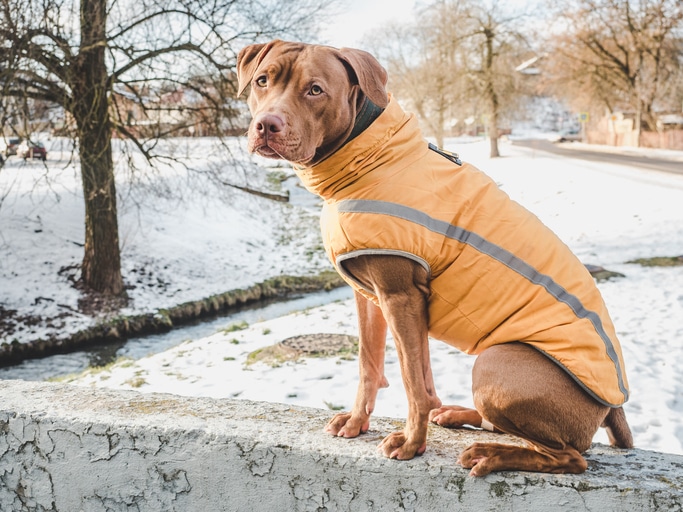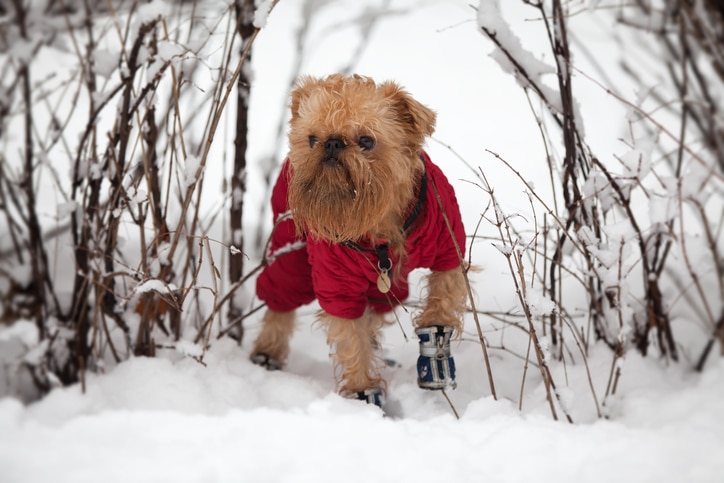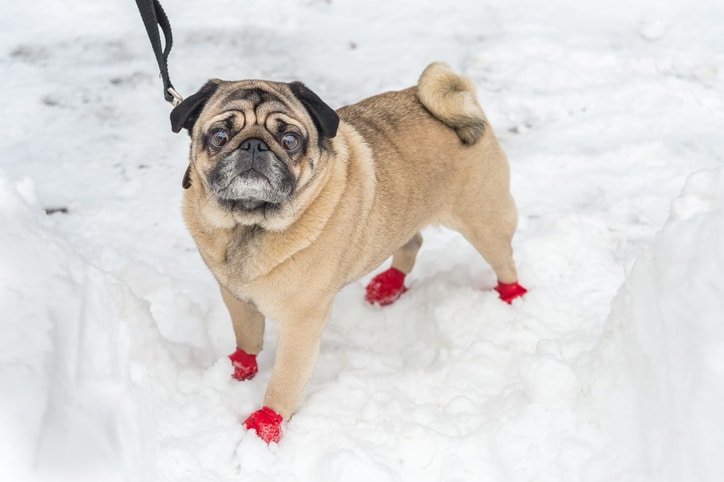Anyone who has owned dogs for a long time knows that their care can shift pretty dramatically in the winter months. This is especially true for very small dogs, dogs with little or no hair, and brachycephalic dogs (any breed with a flattened nose, like boxers and bulldogs). This article will explore many of the most common areas where dogs can suffer in the cold months, and some mistakes that pet parents make.
In general, you need to at least make sure to give your dog extra food and water, as being in the cold can burn a lot more calories. You also need to take care of their feet (or put boots on them), and keep them inside as much as possible. Some breeds are much more cold-tolerant than others, such as huskies, akitas, malamutes, and most very large dogs with thick coats. These dogs enjoy the cold and can play in the snow for hours without any issue, but most of the dogs that are commonly owned in the United States will need some sort of cold weather care.
Can Dogs Experience Frostbite?
Yes, they can. Dogs are susceptible to frostbite forming on their feet during walks in the cold weather. This is especially true for puppies, small dogs, and dogs with thinner coats. Some pet owners are able to use boots to keep their dogs’ feet warm, but some dogs simply will not tolerate wearing anything on their feet. For these dogs, it’s best to keep their walks short. Many pet parents will use jackets, which are generally more tolerable for dogs to wear.

If your dog is very, very small, walking outside in the winter may be too dangerous. For these dogs, it’s possible to train them to use a litter box, or use pee pads in the cold months. If you have a puppy, this can also work, but if your puppy is going to grow into a large breed, you may not want to encourage pottying inside, but this is a question you can certainly work out with your vet.
It’s also very important to never lock your dog inside a car in these cold months, as they can easily get too cold or even freeze in relatively short amounts of time. It’s always best to leave your dog at home if your car ride includes stops that will force you to turn the car off and walk away.
Exercising your dog in the colder months can be more challenging, as your yard may be too cold to let your dog out for too long. Some owners will take their dogs for walks, with jackets and boots, some owners (with large dogs) will let them exercise in the yard, supervised, so they may be let in at the first sign of getting too cold. Another solution you can consider is training your dog to walk on a treadmill.
Can Dogs Suffer from Colds in the Cold Weather?
Yes, they can. Dogs can become ill with a cold virus. Make sure to watch your dog closely for signs of illness, such as coughing, wheezing, trouble breathing, weakness, sneezing, and fever. If your dog is suffering from any of these symptoms, it’s recommended to contact your veterinarian. If your dog is coming home from a holiday stay at a kennel, or they attend doggy daycare, this is even more important. If you are worried, please call your vet to make an appointment to have your dog seen and a treatment plan put into place.
Just like humans with a cold, being outside in the cold weather will do your dog no favors. If they are sick and it’s cold out, please only take your dog for very short potty breaks outside, or, as discussed, let them use pee pads or a litter box.

How Can I Make Sure My Dog is Safe and Healthy in Cold Months?
Along with everything discussed here, there are a few more common pitfalls that can occur in the winter.
Keep Antifreeze Hidden and Away from Your Dog
In cold weather, you may have antifreeze lying around in your garage. Antifreeze is extremely toxic to pets, and because of its sweet smell and taste, if they can get into it, there is a good chance they will ingest it. If you believe your dog has ingested antifreeze, you’ll need to bring your dog to an emergency clinic right away to be purged of this highly toxic substance.
Keep Your Dog on a Leash During Walks
To avoid losing your dog in the cold, always keep your dog on a leash. Most of us probably already do this, but if you and your dog commonly go hiking together, your dog may see a body of water, and jump in, which can be an emergency situation, especially if it is frozen over and your dog gets trapped under the ice. If this happens, you will need to contact emergency services, and take your dog to an emergency vet to treat hypothermia.
Contact Arrowhead Animal Hospital in Westminster, CO
In short, the most common ways dogs can be affected by cold weather is by way of frostbite and getting sick. Remember to give your pet more food and make sure he is drinking enough water. Check your dog’s feet while walking outside and after coming inside, give them a jacket and boots if they will tolerate it, and call your veterinarian if your dog is ill. Any other concerns about your dog’s welfare in the winter can be discussed with your veterinarian as well, especially if your dog is very young, very small, or very old. Together, you and your vet can create a plan to be sure your dog is as safe as he can be in the cold months. And again, some breeds may be totally suited for cold weather – these dogs can safely play in the snow, but they can also get sick, they can also get trapped under ice, or ingest antifreeze. No matter what type of dog you own, you will need to take some precautions in the winter months to ensure your dog’s health and safety.
Our veterinarians at Arrowhead Animal Hospital, are trained to provide quality and compassionate care to your pet. If you have questions regarding your dog’s health or would like to schedule an appointment with one of our skilled doctors, give us a call at (303) 469-1616. We are always here for you and are more than happy to help care for your dog with whatever you need!





